Canada’s six main federal party leaders clashed Monday evening in a two-hour English-language debate.
As expected, the wide-ranging discussion was full of personal barbs and attacks of each other’s policies.
Here is a round-up of fact checks on some of the most notable claims made during the debate by Liberal Leader Justin Trudeau, Conservative Leader Andrew Scheer, New Democratic Party Leader Jagmeet Singh, Bloc Québécois Leader Yves-François Blanchet, Green Party Leader Elizabeth May, and People’s Party of Canada Leader Maxime Bernier.
Liberal Leader Justin Trudeau
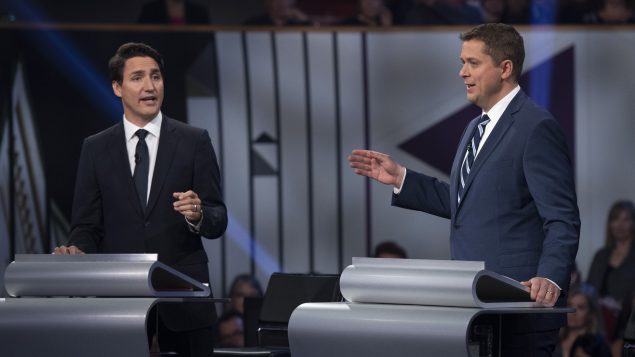
Conservative leader Andrew Scheer and Liberal leader Justin Trudeau debate a point during the Federal leaders debate in Gatineau, Que. on Monday, Oct. 7, 2019. (Justin Tang/THE CANADIAN PRESS)
The claim: Trudeau said his government has brought Canada “three quarters of the way” to achieving an emissions reduction target laid out in the Paris Agreement, which aims to hold the global average temperature increase to well below 2 C above pre-industrial levels, with the ultimate goal of limiting the rise to only 1.5 C.
The facts:
As part of the accord signed by 194 countries, Canada committed to reducing its annual greenhouse gas emissions to 30 per cent below 2005 levels by 2030. This level was first set by the previous Conservative government of former prime minister Stephen Harper.
According to the government’s own estimates published by Environment and Climate Change Canada (ECCC), Canada’s total emissions in 2030 under the best-case scenario are projected to be 19 per cent below 2005 levels.
This means that Canada is on track to reduce its greenhouse gas emissions by about 63 per cent, not 75 per cent claimed by Trudeau.
Conservative Leader Andrew Scheer
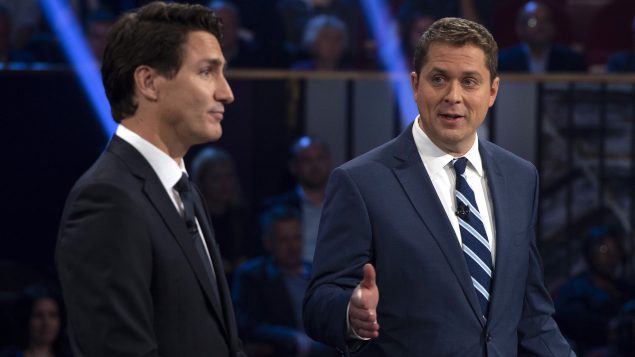
Conservative leader Andrew Scheer, right, makes a point with Liberal leader Justin Trudeau as they discuss a question during the Federal leaders debate in Gatineau, Que. on Monday, Oct. 7, 2019. (Sean Kilpatrick/THE CANADIAN PRESS)
The claim: Scheer said that a Conservative government would reduce the rate of the lowest federal income tax bracket from 15 per cent to 13.75 per cent and pay for its proposed tax cut and credits by reducing “corporate welfare” and slashing “Canada’s foreign aid budget by 25 per cent.”
The facts: The Tories say they can save a combined $3 billion by eliminating some “corporate handouts” and cutting the foreign aid budget.
However, the independent review of the Conservative tax cut proposal by the Parliamentary Budget Officer suggest that in the first year alone it would cost the federal treasury $548 million and rise to $4.86 billion on accrual basis in the 2022-23 fiscal year.
NDP Leader Jagmeet Singh
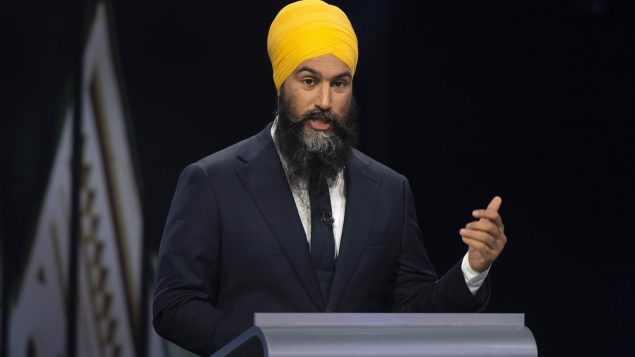
NDP leader Jagmeet Singh speaks during the Federal leaders debate in Gatineau, Que. on Monday, Oct. 7, 2019. (Sean Kilpatrick/THE CANADIAN PRESS)
The claim: Singh said, as he has numerous times on the campaign trail, that the Trudeau government gave $14 billion to corporations so that they could “buy jets and limousines.”
The facts: In its fall economic statement last year, the federal government announced $14 billion in tax incentives for Canadian businesses over the next six years.
Under the plan, businesses can entirely write off the costs of some machinery and clean energy equipment, as well as an increased portion of new assets.
Green Party Leader Elizabeth May
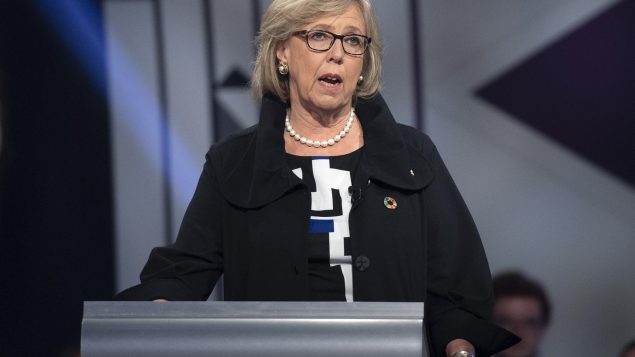
Green Party leader Elizabeth May speaks during the Federal leaders debate in Gatineau, Que. on Monday, Oct. 7, 2019. (Sean Kilpatrick/THE CANADIAN PRESS)
The claim: May called “for taxes on the e-commerce companies, the virtuals, the Amazons and the Googles and the Facebooks that mine billions of dollars out of this country and pay virtually no tax.”
The facts: Foreign-based streaming services without physical presences in Canada don’t have to collect or remit federal (GST) or provincial sales taxes unless they have an agreement with the federal government. Netflix, for instance, has publicly said it would appreciate such an agreement in Canada, and has signed similar deals in other jurisdictions.
Absent a deal, it is up to consumers to pay the sales tax to tax collectors, but this rarely happens.
An August 2017 paper from the C.D. Howe Institute that looked at the digital economy and associated tax policy estimated that companies examined in the report were calculated to have not collected between $85.8 million and $107.3 million in GST.
People’s Party of Canada Leader Maxime Bernier
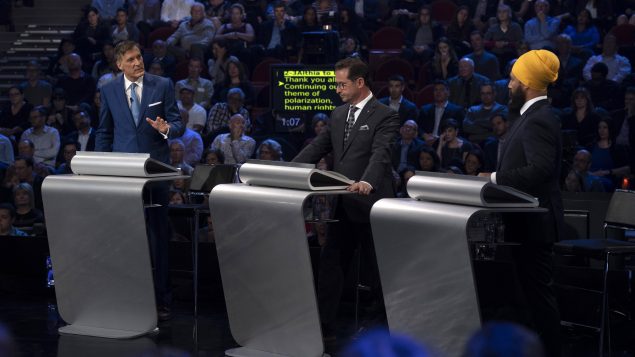
People’s Party of Canada leader Maxime Bernier, left, gestures as he speaks with NDP leader Jagmeet Singh, right, and Bloc Quebecois leader Yves-Francois Blanchet during the Federal leaders debate in Gatineau, Que. on Monday, Oct. 7, 2019. (Justin Tang/THE CANADIAN PRESS)
The claim: Bernier said that “Canada receives more immigrants per capita than any other western country, three times higher than the U.S. … It is the equivalent of one Nova Scotia every three years, the population of Nova Scotia every three years here in Canada.”
The facts: According to Statistics Canada, as of mid-2018, Nova Scotia’s population was 959,942.
The federal immigration plan for 2019-2021 aims to settle 1,021,800 people over three years. So, the plan is to take in slightly more than the population of Nova Scotia.
However, Bernier’s claim that Canada receives more immigrants per capita than any other western country is inaccurate. According to a 2019 Pew Research Center analysis, foreign-born people accounted for 29 per cent of the population in Australia, 23 per cent in New Zealand, 30 per cent in Switzerland. The percentage of foreign-born residents in Canada stood at 21 per cent.
Bloc Quebecois Leader Yves-Francois Blanchet
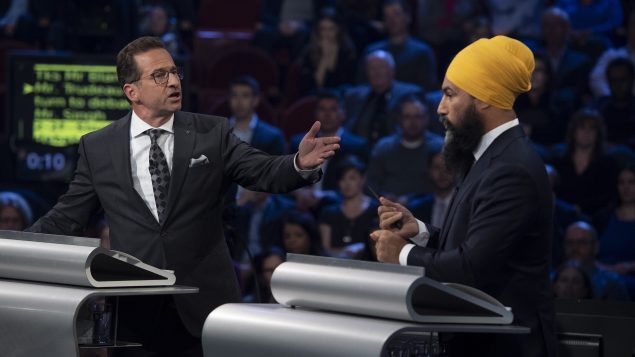
Bloc Quebecois leader Yves-Francois Blanchet and NDP leader Jagmeet Singh debate a point during the Federal leaders debate in Gatineau, Que. on Monday, Oct. 7, 2019. (Justin Tang/THE CANADIAN PRESS)
The claim: Blanchet claimed in an attack on Scheer, who has promised a judicial inquiry into the SNC-Lavalin scandal, that Conservative attacks against Trudeau’s handling of the scandal have had adverse effects on the Montreal-based engineering giant. “The value of the shares are going down, their employees are leaving, the clients are leaving, and they are losing it all because of you,” Blanchet said, addressing Scheer.
The facts: However, Blanchet’s claims are completely inaccurate.
In August, Ethics Commissioner Mario Dion found Trudeau violated the Conflict of Interest Act by trying to pressure former attorney general Jody Wilson-Raybould to overrule a decision by the director of public prosecutions to deny a deferred prosecution agreement to the Montreal-based company, which faces corruption charges over its dealings in Libya.
SNC-Lavalin is accused of paying $47.7 million in bribes to public officials in Libya between 2001 and 2011. SNC-Lavalin, its construction division and a subsidiary also face one charge each of fraud and corruption for allegedly defrauding various Libyan organizations of $129.8 million.
If convicted, SNC-Lavalin would lose the right to bid on federal infrastructure and procurement contracts for 10 years. The World Bank has already barred the engineering firm from bidding on contracts it funds for ten years in relation to another corruption scandal.
The company’s stock price had its single-biggest price drop over the last year on Jan. 28 when the company announced that it was on track to miss its 2018 profit targets because of a serious problem found related to a single project in its mining and metallurgy business. In addition, SNC said it was experiencing worse than expected trading challenges in its oil and gas business in the Middle East, and Saudi Arabia in particular.
However, the SNC-Lavalin scandal broke out only in early February, forcing Wilson-Raybould’s resignation on Feb. 12.
With files from CBC News and The Canadian Press
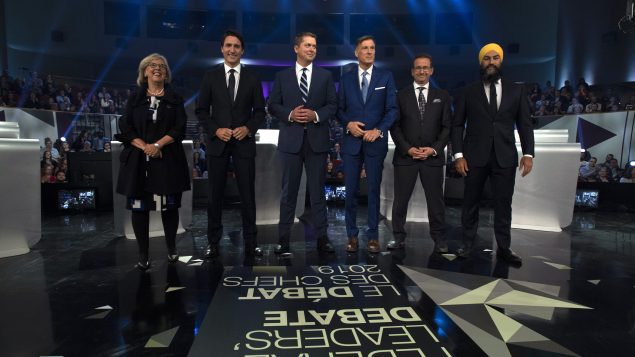






For reasons beyond our control, and for an undetermined period of time, our comment section is now closed. However, our social networks remain open to your contributions.